学生练习篇章词汇理解(选词填空)
- 格式:doc
- 大小:52.50 KB
- 文档页数:4
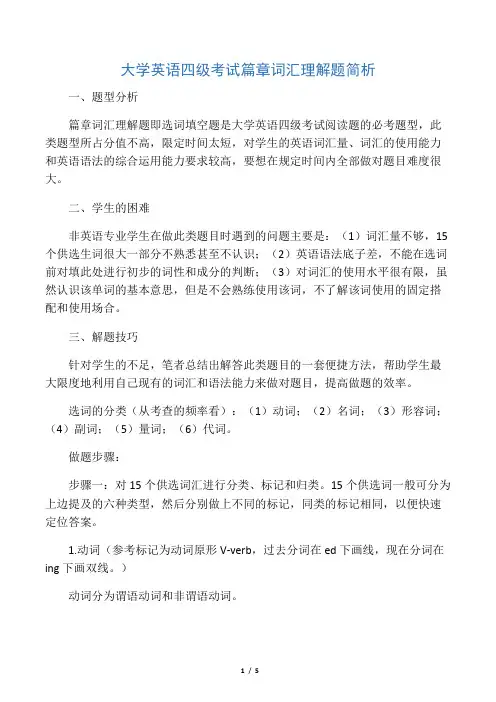
大学英语四级考试篇章词汇理解题简析一、题型分析篇章词汇理解题即选词填空题是大学英语四级考试阅读题的必考题型,此类题型所占分值不高,限定时间太短,对学生的英语词汇量、词汇的使用能力和英语语法的综合运用能力要求较高,要想在规定时间内全部做对题目难度很大。
二、学生的困难非英语专业学生在做此类题目时遇到的问题主要是:(1)词汇量不够,15个供选生词很大一部分不熟悉甚至不认识;(2)英语语法底子差,不能在选词前对填此处进行初步的词性和成分的判断;(3)对词汇的使用水平很有限,虽然认识该单词的基本意思,但是不会熟练使用该词,不了解该词使用的固定搭配和使用场合。
三、解题技巧针对学生的不足,笔者总结出解答此类题目的一套便捷方法,帮助学生最大限度地利用自己现有的词汇和语法能力来做对题目,提高做题的效率。
选词的分类(从考查的频率看):(1)动词;(2)名词;(3)形容词;(4)副词;(5)量词;(6)代词。
做题步骤:步骤一:对15个供选词汇进行分类、标记和归类。
15个供选词一般可分为上边提及的六种类型,然后分别做上不同的标记,同类的标记相同,以便快速定位答案。
1.动词(参考标记为动词原形V-verb,过去分词在ed下画线,现在分词在ing下画双线。
)动词分为谓语动词和非谓语动词。
谓语动词是该句的主动词,它体现了时态,一般只要看空格处前后有无主动词,有没有体现该句时态的动词,如一般现在时、现在进行时等,若没有,就可以判断此处为谓语动词,那就环顾上下文确定下时态和句意,接着在供选词内寻找即可。
例如2009年1月的四级真题:While enriching their imagination,books ?摇55?摇their outlook,develop a fact-findingattitude and train them…这里就是缺少一个谓语动词,再根据上下文发觉时态是一般现在时,因为这个谓语动词的并列动词(develop,train)都是一般现在时,所以时态肯定是一般现在时。
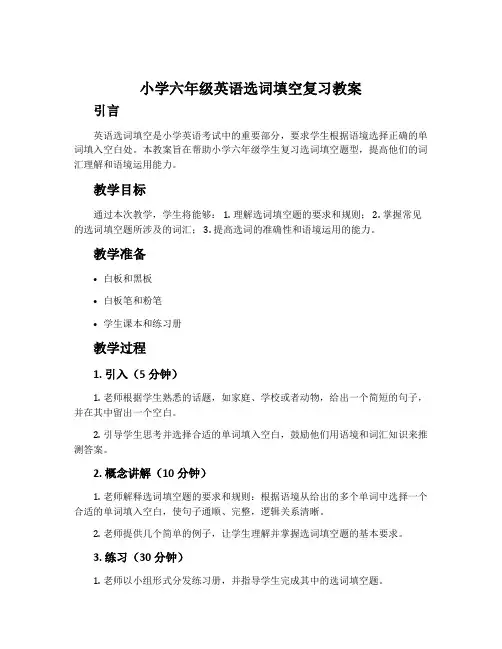
小学六年级英语选词填空复习教案引言英语选词填空是小学英语考试中的重要部分,要求学生根据语境选择正确的单词填入空白处。
本教案旨在帮助小学六年级学生复习选词填空题型,提高他们的词汇理解和语境运用能力。
教学目标通过本次教学,学生将能够: 1. 理解选词填空题的要求和规则; 2. 掌握常见的选词填空题所涉及的词汇; 3. 提高选词的准确性和语境运用的能力。
教学准备•白板和黑板•白板笔和粉笔•学生课本和练习册教学过程1. 引入(5分钟)1.老师根据学生熟悉的话题,如家庭、学校或者动物,给出一个简短的句子,并在其中留出一个空白。
2.引导学生思考并选择合适的单词填入空白,鼓励他们用语境和词汇知识来推测答案。
2. 概念讲解(10分钟)1.老师解释选词填空题的要求和规则:根据语境从给出的多个单词中选择一个合适的单词填入空白,使句子通顺、完整,逻辑关系清晰。
2.老师提供几个简单的例子,让学生理解并掌握选词填空题的基本要求。
3. 练习(30分钟)1.老师以小组形式分发练习册,并指导学生完成其中的选词填空题。
2.学生在小组内相互讨论、比较答案,并解释自己的选词理由。
3.老师在黑板上展示每个题目的答案,与学生进行答案讨论和解释。
4. 错题讲解(10分钟)1.老师选取几道学生常犯的错题,进行详细讲解和分析。
2.引导学生思考错误的原因,并给出正确的解决方法和答案。
5. 拓展练习(15分钟)1.老师布置一些拓展练习,要求学生在家完成。
2.学生批改练习并记录自己的得分,下节课可以与老师和同学一起分享。
教学总结通过本次教学,学生对选词填空题型有了更深入的理解,并通过练习提高了自己的选词准确性和语境运用能力。
同学们要积极参与课堂活动,并在课后进行拓展练习,不断提升自己的英语水平。
参考资料•无。
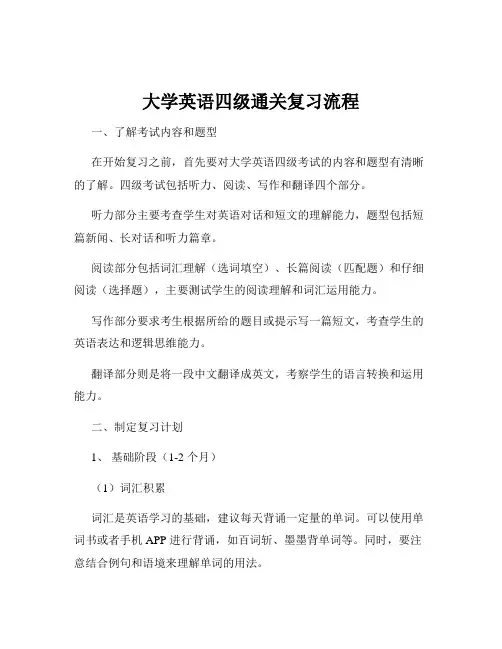
大学英语四级通关复习流程一、了解考试内容和题型在开始复习之前,首先要对大学英语四级考试的内容和题型有清晰的了解。
四级考试包括听力、阅读、写作和翻译四个部分。
听力部分主要考查学生对英语对话和短文的理解能力,题型包括短篇新闻、长对话和听力篇章。
阅读部分包括词汇理解(选词填空)、长篇阅读(匹配题)和仔细阅读(选择题),主要测试学生的阅读理解和词汇运用能力。
写作部分要求考生根据所给的题目或提示写一篇短文,考查学生的英语表达和逻辑思维能力。
翻译部分则是将一段中文翻译成英文,考察学生的语言转换和运用能力。
二、制定复习计划1、基础阶段(1-2 个月)(1)词汇积累词汇是英语学习的基础,建议每天背诵一定量的单词。
可以使用单词书或者手机 APP 进行背诵,如百词斩、墨墨背单词等。
同时,要注意结合例句和语境来理解单词的用法。
(2)语法复习回顾高中所学的语法知识,重点掌握时态、语态、从句等常见语法点。
可以通过语法书或者在线课程进行系统复习。
(3)听力训练每天听一篇英语短文或对话,可以选择历年四级真题听力、BBC 英语、VOA 慢速英语等材料。
听完后,对照原文,找出自己没听懂的地方,反复听几遍。
2、强化阶段(1-2 个月)(1)阅读练习每周做 3-4 套阅读真题,按照考试时间和要求完成。
做完后,认真分析错题原因,总结答题技巧,如如何快速定位关键信息、如何猜测生词的意思等。
(2)写作训练每两周写一篇作文,可以参考历年真题的题目。
写完后,对照范文进行修改,学习范文的结构、思路和语言表达方式。
(3)翻译练习每周做 2-3 道翻译真题,注意积累常见的词汇和短语的翻译,以及一些特殊句型的翻译方法。
3、冲刺阶段(1 个月)(1)模拟考试按照考试时间和要求,每周进行一次全真模拟考试,使用最新的四级真题。
通过模拟考试,熟悉考试流程和节奏,调整好考试心态。
(2)错题回顾将之前做过的真题中的错题重新做一遍,分析错误原因,加深对知识点的理解和记忆。
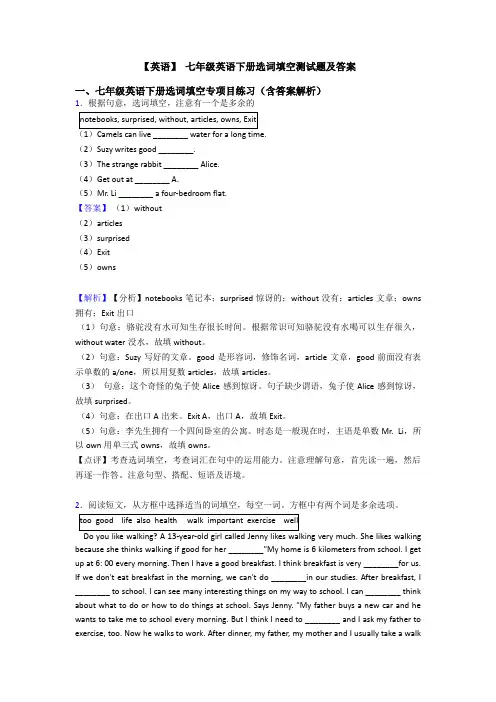
【英语】七年级英语下册选词填空测试题及答案一、七年级英语下册选词填空专项目练习(含答案解析)1.根据句意,选词填空,注意有一个是多余的(2)Suzy writes good ________.(3)The strange rabbit ________ Alice.(4)Get out at ________ A.(5)Mr. Li ________ a four-bedroom flat.【答案】(1)without(2)articles(3)surprised(4)Exit(5)owns【解析】【分析】notebooks笔记本;surprised惊讶的;without没有;articles文章;owns 拥有;Exit出口(1)句意:骆驼没有水可知生存很长时间。
根据常识可知骆驼没有水喝可以生存很久,without water没水,故填without。
(2)句意:Suzy写好的文章。
good是形容词,修饰名词,article文章,good前面没有表示单数的a/one,所以用复数articles,故填articles。
(3)句意:这个奇怪的兔子使Alice感到惊讶。
句子缺少谓语,兔子使Alice感到惊讶,故填surprised。
(4)句意:在出口A出来。
Exit A,出口A,故填Exit。
(5)句意:李先生拥有一个四间卧室的公寓。
时态是一般现在时,主语是单数Mr. Li,所以own用单三式owns,故填owns。
【点评】考查选词填空,考查词汇在句中的运用能力。
注意理解句意,首先读一遍,然后再逐一作答。
注意句型、搭配、短语及语境。
2.阅读短文,从方框中选择适当的词填空,每空一词。
方框中有两个词是多余选项。
because she thinks walking if good for her ________"My home is 6 kilometers from school. I get up at 6: 00 every morning. Then I have a good breakfast. I think breakfast is very ________for us. If we don't eat breakfast in the morning, we can't do ________in our studies. After breakfast, I ________ to school. I can see many interesting things on my way to school. I can ________ think about what to do or how to do things at school. Says Jenny. "My father buys a new car and he wants to take me to school every morning. But I think I need to ________ and I ask my father to exercise, too. Now he walks to work. After dinner, my father, my mother and I usually take a walkin the park near our house. I have a happy family. And we have a healthy ________.【答案】 health;important;well;walk;also;exercise;life【解析】【分析】文章大意:本文主要介绍喜欢步行的一个叫珍妮的13岁女孩和喜欢步行的原因。
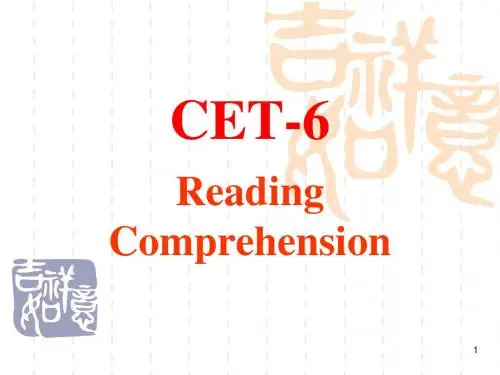

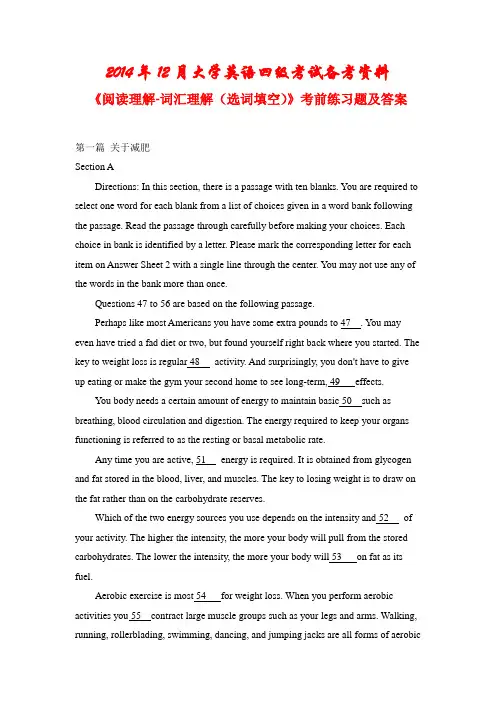
2014年12月大学英语四级考试备考资料《阅读理解-词汇理解(选词填空)》考前练习题及答案第一篇关于减肥Section ADirections: In this section, there is a passage with ten blanks. You are required to select one word for each blank from a list of choices given in a word bank following the passage. Read the passage through carefully before making your choices. Each choice in bank is identified by a letter. Please mark the corresponding letter for each item on Answer Sheet 2 with a single line through the center. You may not use any of the words in the bank more than once.Questions 47 to 56 are based on the following passage.Perhaps like most Americans you have some extra pounds to 47 . You may even have tried a fad diet or two, but found yourself right back where you started. The key to weight loss is regular 48 activity. And surprisingly, you don't have to give up eating or make the gym your second home to see long-term, 49 effects.You body needs a certain amount of energy to maintain basic 50 such as breathing, blood circulation and digestion. The energy required to keep your organs functioning is referred to as the resting or basal metabolic rate.Any time you are active, 51 energy is required. It is obtained from glycogen and fat stored in the blood, liver, and muscles. The key to losing weight is to draw on the fat rather than on the carbohydrate reserves.Which of the two energy sources you use depends on the intensity and 52 of your activity. The higher the intensity, the more your body will pull from the stored carbohydrates. The lower the intensity, the more your body will 53 on fat as its fuel.Aerobic exercise is most 54 for weight loss. When you perform aerobic activities you 55 contract large muscle groups such as your legs and arms. Walking, running, rollerblading, swimming, dancing, and jumping jacks are all forms of aerobicactivity.Surprisingly, if your aerobic activity is low to moderately intense and of long duration, you will burn more fat than if you had 56 in a short burst ofhigh-intensity exercise. In short, a brisk 30-minute walk will burn fat while a100-yard sprint will burn glycogen.[A] positive[B] additional[C] duration[D] effectivee[E] shed [F] physical[G] food [H] functions [I] participated [J] rely [K] cut [L] repeatedly[M] uses [N] little [O] obvious47. E48. F49. A50. H51. B52. C53. J54. D55. L56. I第二篇关于太阳花A sunflower is a sunflower. A mobile phone is a mobile phone. But can you 47 the two to do something for your local 48 ?It may well be possible. When you have finished with your mobile phone you will be able to 49 it in the garden or a plant pot and wait for it to flower.50 , a biodegradable (生物可降解的)mobile phone was introduced by scientists. It is hoped that the new type of phone will encourage 51 to recycle.Scientists have come up with a new material over the last five years. It looks like any other 52 and can be hard or soft. and able to change shape. Overtime it can alsobreak down into the soil without giving out any toxic 53 . British researchers used the new material to develop a phone cover that contains a sunflower seed. When this new type of cover turns into waste, it 54 nitrates(硝酸盐). These feed the seed and help the flower grow.Engineers have designed a small 55 window to hold the seed. They have made sure it only grows when the phone is thrown away."We've only put sunflower seeds into the covers so far. But we are working with plant 56 to find out which flowers would perform best. Maybe we could put roses in next time," said one scientist.[A] Recently [B] consumer [C] chemical [D] environment [E] combine[F] transparent [G] buy [H] companion [I] experts [J] forms [K] bury[L] paper [M] paper [N] plastic [O] Usually47. E48. D49. K50. A51. B52. N53. C54. J55. F56. I第三篇关于外教Questions 47 to 56 are based on the following passage.In recent years, more and more foreigners are involved in the teaching programs of the United States. Both the advantages and the disadvantages47 using foreign faculty in teaching positions have to be48 , of course. It can be said that the foreign background that makes the faculty member from abroad an asset also49 problems of adjustment, both for the university and for the individual. The foreign researchscholar usually isolates himself in the laboratory as a means of protection; 50 , what he needs is to be fitted to a highly organized university system quite different from51 at home. He is faced in his daily work with differences in philosophy, arrangements of courses and methods of teaching. Both the visiting professor and his students52 a common ground in each other’s cultures, some concept of what is already in the minds of American students is53 for the foreign professor. While helping him to adapt himself to his new environment, the university must also 54 certain adjustments in order to take full advantage of what the newcomer can55 . It isn’t always known how to make creative use of foreign faculty, especially at smaller colleges. This is thought to be a56 where further study is called for. The findings of such a study will be of value to colleges and universities with foreign faculty.A)field B)possess C)considered D)express E)offer F)create G)requiredH)of I)emerge J)make K)lack L)however M)scope N)cause O)that47. H48. C)49. F)50. L)51. O)52. K)53. G)54. J)55. E)56. A)第四篇关于摇滚Questions 47 to 56 are based on the following passage.Rock and roll is a genre of popular music that evolved in the United States in the late 1940s and early 1950s. Its 47 lie mainly in blues, rhythm and blues, country, folk, gospel, and jazz. The style subsequently spread to the rest of the world and developed further, leading ultimately to 48 rock music.The term “rock and roll”now covers at least two different meanings, both in common usage. The American Heritage Dictionary and the Merriam-Webster Dictionary both 49 rock and roll as synonymous with rock music.50 , defines the term as referring specifically to the music of the 1950s.Classic rock and roll is 51 played with one or two electric guitars, a string bass or an electric bass guitar, and a drum kit. In the 52 rock and roll styles of the late 1940s, either the piano or saxophone was often the lead instrument, but these were generally 53 or supplemented by the guitar in the middle to late 1950s.The massive popularity and eventual worldwide view of rock and roll gave it a 54 social impact. Far beyond simply a musical style, rock and roll, as seen in movies and in the new medium of television, 55 lifestyles, fashion, attitudes, and language. It went on to spawn various sub-genres, often without the initially 56 backbeat, that are now more commonly called simply “rock music”or “rock”.A) define I) followed B) characteristic J) modernC) unique K) explanation D) roots L) ConverselyE) usually M) replaced F) Basically N) prepareG) earliest O) seldoH) influencedSection A47. D)。
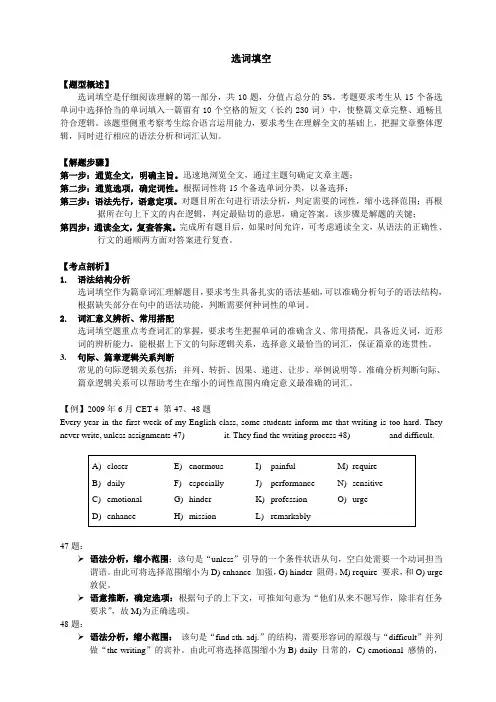
选词填空【题型概述】选词填空是仔细阅读理解的第一部分,共10题,分值占总分的5%。
考题要求考生从15个备选单词中选择恰当的单词填入一篇留有10个空格的短文(长约230词)中,使整篇文章完整、通畅且符合逻辑。
该题型侧重考察考生综合语言运用能力,要求考生在理解全文的基础上,把握文章整体逻辑,同时进行相应的语法分析和词汇认知。
【解题步骤】第一步:通览全文,明确主旨。
迅速地浏览全文,通过主题句确定文章主题;第二步:通览选项,确定词性。
根据词性将15个备选单词分类,以备选择;第三步:语法先行,语意定项。
对题目所在句进行语法分析,判定需要的词性,缩小选择范围;再根据所在句上下文的内在逻辑,判定最贴切的意思,确定答案。
该步骤是解题的关键;第四步:通读全文,复查答案。
完成所有题目后,如果时间允许,可考虑通读全文,从语法的正确性、行文的通顺两方面对答案进行复查。
【考点剖析】1.语法结构分析选词填空作为篇章词汇理解题目,要求考生具备扎实的语法基础,可以准确分析句子的语法结构,根据缺失部分在句中的语法功能,判断需要何种词性的单词。
2.词汇意义辨析、常用搭配选词填空题重点考查词汇的掌握,要求考生把握单词的准确含义、常用搭配,具备近义词,近形词的辨析能力,能根据上下文的句际逻辑关系,选择意义最恰当的词汇,保证篇章的连贯性。
3.句际、篇章逻辑关系判断常见的句际逻辑关系包括:并列、转折、因果、递进、让步、举例说明等。
准确分析判断句际、篇章逻辑关系可以帮助考生在缩小的词性范围内确定意义最准确的词汇。
【例】2009年6月CET-4 第47、48题Every year in the first week of my English class, some students inform me that writing is too hard. They never write, unless assignments 47) ________ it. They find the writing process 48) ________ and difficult.47题:语法分析,缩小范围:该句是“unless”引导的一个条件状语从句,空白处需要一个动词担当谓语。
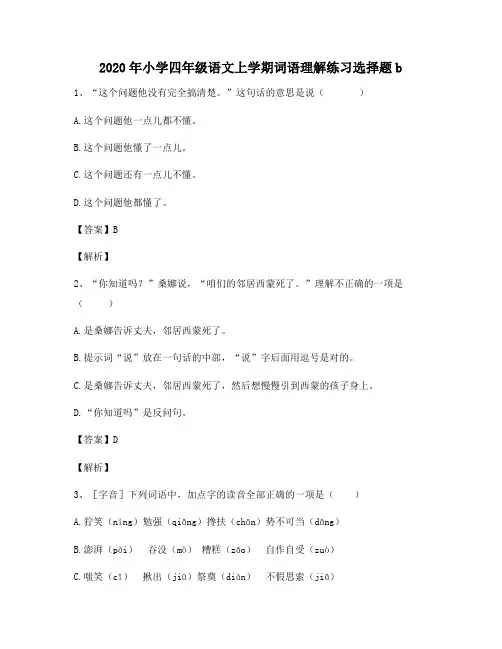
2020年小学四年级语文上学期词语理解练习选择题b1、“这个问题他没有完全搞清楚。
”这句话的意思是说()A.这个问题他一点儿都不懂。
B.这个问题他懂了一点儿。
C.这个问题还有一点儿不懂。
D.这个问题他都懂了。
【答案】B【解析】2、“你知道吗?”桑娜说,“咱们的邻居西蒙死了。
”理解不正确的一项是()A.是桑娜告诉丈夫,邻居西蒙死了。
B.提示词“说”放在一句话的中部,“说”字后面用逗号是对的。
C.是桑娜告诉丈夫,邻居西蒙死了,然后想慢慢引到西蒙的孩子身上。
D.“你知道吗”是反问句。
【答案】D【解析】3、[字音]下列词语中,加点字的读音全部正确的一项是()A.狞笑(níng)勉强(qiǎng)搀扶(chān)势不可当(dǎng)B.澎湃(pài)吞没(mò)糟糕(zāo)自作自受(zuò)C.嗤笑(cī)揪出(jiū)祭奠(diàn)不假思索(jiǎ)D.呻吟(yíng)蜷缩(quán )折腾(zhē)忐忑不安(tǎn )【答案】B【解析】此题考查学生对字音的辨析识记能力。
平时学习中,我们要区分同音字、形近字,认清字形再组词。
A势不可当(dǎng)——dāngC嗤笑(cī)——chīD呻吟(yíng)——yín4、下列词语中没有错别字的一项是()A.制载扭捏矫揉造作B.广袤涵养断章取意C.絮叨劫掠大发雷霆D.妖娆恪守相得益嶂【答案】C【解析】A制载—制裁; B断章取意—断章取义;D相得益嶂—相得益彰;故选C。
5、“禁不住”中加点字的读音与其下面哪个读音一样?()A.禁止B.禁闭C.严禁D.禁得起【答案】D【解析】本题主要考查学生对多音字的掌握情况。
在于平时学生对读音的的辨析。
多音字读音不同,义不同,组成的词语也不同,解答此题,要求学生首先要读准词语,然后依据汉字选择正确的音节即可。
禁不住(jīn);禁止、禁闭、严禁都是读(jìn),禁得起(jīn),因此选D。
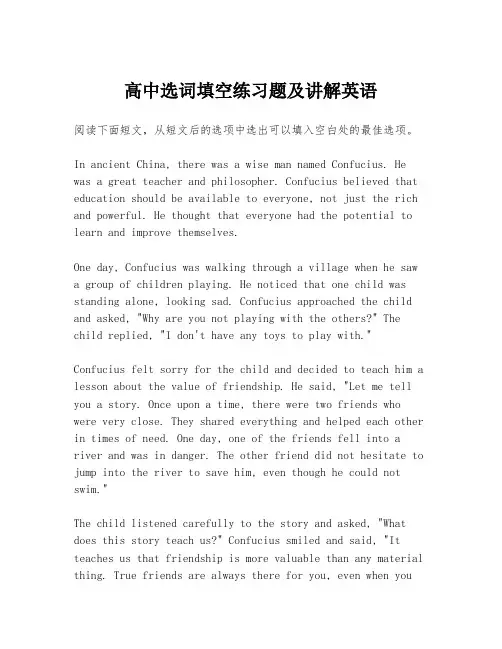
高中选词填空练习题及讲解英语阅读下面短文,从短文后的选项中选出可以填入空白处的最佳选项。
In ancient China, there was a wise man named Confucius. He was a great teacher and philosopher. Confucius believed that education should be available to everyone, not just the rich and powerful. He thought that everyone had the potential to learn and improve themselves.One day, Confucius was walking through a village when he saw a group of children playing. He noticed that one child was standing alone, looking sad. Confucius approached the child and asked, "Why are you not playing with the others?" The child replied, "I don't have any toys to play with."Confucius felt sorry for the child and decided to teach him a lesson about the value of friendship. He said, "Let me tell you a story. Once upon a time, there were two friends who were very close. They shared everything and helped each other in times of need. One day, one of the friends fell into a river and was in danger. The other friend did not hesitate to jump into the river to save him, even though he could not swim."The child listened carefully to the story and asked, "What does this story teach us?" Confucius smiled and said, "It teaches us that friendship is more valuable than any material thing. True friends are always there for you, even when youhave nothing."The child's eyes lit up with understanding. From that day on, he started to play with the other children and made many friends. He learned that the most important thing in life is not what you have, but who you have around you.选项A. HoweverB. ThereforeC. BecauseD. AlthoughE. SinceF. UnlessG. BesidesH. If答案解析1. 空白处前的句子是"Confucius felt sorry for the child",空白处后的句子是"he decided to teach him a lesson"。
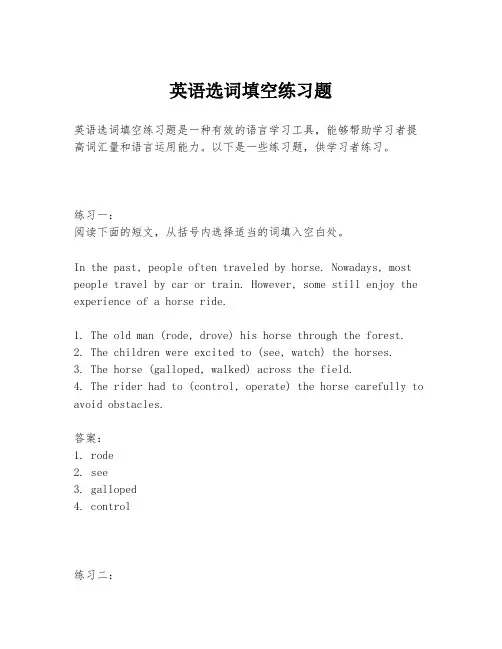
英语选词填空练习题英语选词填空练习题是一种有效的语言学习工具,能够帮助学习者提高词汇量和语言运用能力。
以下是一些练习题,供学习者练习。
练习一:阅读下面的短文,从括号内选择适当的词填入空白处。
In the past, people often traveled by horse. Nowadays, most people travel by car or train. However, some still enjoy the experience of a horse ride.1. The old man (rode, drove) his horse through the forest.2. The children were excited to (see, watch) the horses.3. The horse (galloped, walked) across the field.4. The rider had to (control, operate) the horse carefully to avoid obstacles.答案:1. rode2. see3. galloped4. control练习二:根据上下文,选择最合适的词填入空白处。
The weather was perfect for a picnic. The sun was shining, and there was a gentle breeze.1. We (prepared, packed) a basket with food and drinks.2. We found a nice spot under a (shade, shadow).3. The (scenery, view) was breathtaking.4. After eating, we played some (games, sports) and enjoyed the day.答案:1. packed2. shade3. view4. games练习三:阅读下面的对话,从括号内选择正确的词填入空白处。
英语四级选词填空题解题步骤及答题技巧一:测试目的篇章词汇理解题目是大学英语四级考试的新题型,由于取消了以往词汇和结构的四选一的题目,大学英语四六级考试委员会为了更好的测试考生掌握词汇的情况,所以出现了新四级的词汇理解题(或选词填空题)。
这种题型事实上也是完形填空的一种,目的在于考查对上下文的理解和词汇的应用能力。
以前的词汇题是以单句的形式考查考生,而新四级是以篇章的形式考查考生对词汇的理解。
也就是说,以前的词汇题考生可以通过备考期间的题海战术得到高分,现在的篇章词汇理解题应该说用短时间的题海战术是很难得高分的。
二:测试形式选词填空题占整个考试的分值比例为5%(35分/710分)。
一篇阅读文章,长度在250词左右,题目为10道选词填空题,要求从给出的15个词中选择10个填入合适的空档中。
三:基本要求1. 篇章词汇理解题考查的对象皆为实义词,主要包括名词、动词、形容词、副词,所以要求考生应该熟知大学英语四级的积极词汇,熟知单词的词类和不同意思。
2. 词汇理解题目顾名思义是要理解,也就是要求考生对上下文的理解,尤其是上文的理解,要求比较高。
3. 由于考试的形式是选词填空,所以考生必须熟知一些基本的语法知识,例如:词性的归纳(4种词性,名词、动词、形容词、副词)、基于语法的判断(单复数、ing形式等)、常用搭配的掌握都有助于解题。
四:答题步骤第一步:略读全文,定中心考生拿到题目以后,由于考查考生对篇章的理解,首先应该略读整篇文章,确定文章的中心或主要说明的问题。
文章大概在220词--250词左右,用1分钟左右的时间略读即可。
第二步:详读选项,词分类选项中的15个词是考查的关键,考生应该详细的理解这15个单词。
熟悉的单词标明词性和词义,不熟悉的单词或者不认识的单词只需标明词性,然后根据名词、动词、形容词、副词四大类按规律排列在试卷上。
第三步:瞻前顾后,灵活选词性分类之后,回到原文中,根据原文中空格的前后单词或者前后语句确定所要填的词性,然后从分类好的单词中选择出词性、意思、语法都符合要求的最佳选项。
选词填空的解题方法与技巧一、引言选词填空是一种常见的语言测试题型,主要考察学生对词汇、语法和语境的理解能力。
在英语考试中,选词填空是常见的题型之一,对于很多学生来说也是较为困难的题型之一。
本文将介绍选词填空的解题方法与技巧,帮助学生更好地应对这种题型。
二、解题方法1.理解语境在选词填空题中,理解语境是非常重要的。
学生需要认真阅读题目中的句子,理解其含义和上下文语境,从而确定需要填入的词汇。
2.分析句子结构分析句子结构也是解题的关键。
学生需要确定句子中的主语、谓语和宾语等成分,以及各个成分之间的关系,从而确定需要填入的词汇的词性和形式。
3.考虑词汇搭配在选词填空中,词汇搭配也是需要考虑的因素之一。
学生需要了解常见的词汇搭配,以及不同词汇之间的搭配关系,从而选择正确的词汇。
4.排除法当学生对于需要填入的词汇不确定时,可以采用排除法来缩小选择范围。
学生可以根据自己对语境、句子结构和词汇搭配的理解,排除一些明显不符合条件的词汇,从而缩小选择范围。
三、技巧建议1.多练习选词填空是需要不断练习的题型之一。
学生可以通过多做题、多阅读英文文章和多听英文广播等方式,提高自己的语言理解能力和词汇量,从而提高做题的准确性和速度。
2.注意细节在选词填空中,细节决定成败。
学生需要认真阅读题目,注意每个空格处需要填入的词汇的形式和词性,以及整个句子的语法和拼写错误。
同时,学生还需要注意空格处前后词语的搭配和含义,从而选择正确的词汇。
3.善于总结在练习过程中,学生需要善于总结经验教训。
学生可以总结出一些常见的词汇搭配和语法结构,以及自己容易犯错的地方和解题的难点,从而有针对性地进行练习和提高。
同时,学生还需要总结出一些解题技巧和策略,提高自己的解题效率和质量。
4.保持积极心态选词填空虽然是一种较为困难的题型之一,但只要学生保持积极的心态和耐心,不断练习和总结经验教训,就能够逐渐提高自己的解题能力。
同时,学生还需要注意时间的分配和控制,避免因为时间不够而影响解题效果。
2022英语四级各题分数分配及分值第一篇:《2022年12月英语四级【六级】题型及分值》2022年12月英语四级【六级】(CET4(6))题型及分值(参考)总述:试卷由写作、听力理解、阅读理解和翻译四个部分组成,分值比例为:写作15%(106。
5分),听力35%(248。
5分),阅读35%(248。
5分),翻译15%(106。
5分)。
内容比值分数写作15%(106。
5)听力35%(248。
5)阅读35%(248。
5)翻译15%(106。
5)听力部分:时间:30分钟每个题都是7。
1分总分248。
5短对话:1-8题每个7。
1分总共87。
1=56。
8分长对话:9-15题每个7。
1分总共77。
1=49。
7分短文理解:16-25题每个7。
1分总共107。
1=71分短文听写:26-35题每个7。
1分总共107。
1=71分(无长句)建议买一本专项练习,历年真题要多听;特别是做的第一篇题,反复听,直到听懂,最好坚持每天半个小时(考前一月)。
阅读读解部分:时间:40分钟占试题35%总分248。
5选词填空:36-45题每个3、55分总共103、55=35、5分短句匹配:46-55题每个7。
1分总共107。
1=71分写作部分:时间:30分钟占比例15%,满分为106。
5这部分建议考前一月背诵各种类型的模板1-2篇翻译部分:时间:30分钟占比例15%,满分为106。
5这部分分数较高应重视建议买一本专项练习训练做题第二篇:《2022年12月英语四级分数分配》【总分:710份】一、英语四级作文说明:写作部分占整套试卷的15%=106。
5分在这部分你要达到63、9分为及格。
时间:30分钟二、听力部分=248。
5分【2022英语四级各题分数分配及分值】1、听力部分占整套试题的35%,每个题都是7。
1分。
2、短对话8%8个题目每小题7。
1分。
3、长对话7%。
分为2段,每段3-4个题,共7小题,每小题7。
1份。
4、短文理解10%共10个小题,每小题7。
全国大学英语四、六级考试选词填空题型分析、解题策略一、题型分析(一)考试简介。
全国大学英语四、六级考试(College English Test—Band Four/Six,以下简称CET-4/6)是由国家教育部高等教育司主持的全国性英语考试。
考试主要面向修读完大学英语相应阶段课程的在校大学生,目的在于参照《大学英语教学指南》设定的教学目标对我国大学生实际英语综合运用能力进行科学的检测和衡量,同时为用人单位了解我国大学生英语水平提供参考依据。
笔试包括写作、听力理解、阅读理解和翻译四个部分,其中,阅读理解部分有词汇理解(选词填空)、长篇阅读(段落匹配)和仔细阅读(单项选择)三种题型。
(二)“选词填空”题型介绍。
“选词填空”题旨在测试学生的篇章理解能力和语言词汇知识。
阅读材料为一篇带有10个空白、长度为240个—290个词的英语原版短文,多选自报纸杂志、书籍、学术期刊等,题材涵盖人文学科、社会科学、自然科学等领域,体裁包括记叙性、说明性、议论性文章等。
通过阅读文章,考生需要在8分钟—9分钟内从由15个单词选项组成的词库(word bank)中选择10个分别填入文章中对应的空白处,将文章补充完整,每个选项最多使用一次。
该部分在整个考试中占5%的分值比例。
与传统“4选1”的完形填空或词汇语法题型相比,“15选1”的选词填空题大大降低了考生猜中答案的概率,使对考生阅读理解和词汇积累的考查更加真实有效,然而无形中也大大增加了考试的难度。
加上每个单词最多只能被选择一次,一个选项的错误可能造成连环错误。
从学生反馈和考试结果看,选词填空是CET-4/6中难度最大、得分最低的题型之一。
从历年考试题目来看,组成选项词库的单词以名词、动词、形容词、副词等实义词为主,侧重对考生词法、句法、篇章、阅读等各方面语言能力的考查,要求考生不仅熟知选项的词义、词性和常用搭配,还具备在一定的上下文语境中理解并应用词汇的能力;不仅能够将复杂句式逐步分析简化、理清句子结构,还要掌握基本的语法规则知识并具备一定的逻辑推理能力。
篇章词汇理解配套练习Passage 1Most people would agree that, although our age exceeds all previous ages in knowledge, there has been no corresponding increase in wisdom. But agreement (47) as soon as we attempt to define “wisdom” and consider means of promoting it.There are several factors that (48) to wisdom. Of these I should put first a sense of proportion: the capacity to take (49) of all the important factors in a problem and to (50) to each its due weight. This has become more difficult than it used to be owing to the extent and (51) of the special knowledge required of various kinds of technicians. Suppose, for example, that you are (52) in research in scientific medicine. The work is difficult and is likely to (53) the whole of your mind. You have no time to consider the effect which your discoveries or inventions may have outside the field of medicine. You succeed (let us say) as modern medicine has succeeded, in enormously lowering the infant death-rate, not only in Europe and America, but also in Asia and Africa. This has the entirely unintended result of making the food supply (54) and lowering the standard of life in the parts of the world that have the greatest populations. To take an even more (55) example, which is in everybody's mind at the present time; you study the makeup of the atom from a disinterested(无利害关系的) desire for knowledge, and by chance place in the hands of a powerful mad man the means of destroying the human race.Therefore ,with every increase of knowledge and skill, wisdom becomes more necessary, for every such increase augments(增强) our capacity for realizing our purposes, and therefore augments our (56) for evil ,if our purposes are unwise.A) halts B) discount C) dramaticD) contribute E) ceases F) accountG) attack H) attach I) inadequateJ) capacity K) engaged L) absorbM) distribute N) complex O) complexityPassage 2A book like this is never the work of a single author or even a small group of authors; rather there are many people and institutions whose (47) need to be acknowledged. In the first place, we wish to thank the many scholars and sales managers who have (48) so diligently over the last 20 years to move the study of sales management out of the dark ages and into the (49) of marketing thought. We would also like to (50) the special contributions of the Marketing Science Institute, which supported much of the recent research, and especially Steve Greyser, and Diane Schmalensee for their willingness to (51) MSI's energies and resources to the study of sales management before it became a fashionable topic.Scholars -- even those in marketing -- are sometimes not very customer-oriented, (52) when it comes to writing textbooks. We have made much effort to avoid such a heresy. (53), we offer special thanks to the more than 60 professors who (54) to our questionnaire about their attitudes toward the precious edition of this book. The information they (55) was very helpful in our effort to make the third edition a more useful book for teaching and learning.We also thank our many students over the years for their comments and suggestions. The book is better because of their insights.We hope we haven't forgotten anyone, and we apologize to those whose suggestions we failed to include. Needless to say, we assume full (56) for any errors or omissions in this book.A) consequently B) apply C) respondedD) provided E) responsibility F) justifiedG) finally H) labored I) mainstreamJ) patience K) acknowledge L) particularlyM) commit N) efforts O) disposePassage 3What does a young child's ability not to eat a marshmallow have to do with success in life? Quite a lot, as it turns out. The 4-year-old child who is able to hold out in order to receive a second treat is (47) more self-control that will serve him or her well as an adult.This ability to control one's (48) is just one part of what is called Emotional intelligence. The children who (49) it will grow up to be better (50) and more successful. Those kids who don't have it are less likely to succeed when it comes to meeting (51) and dealing with life frustrations.In the past, our concept of intelligence was mainly limited to the kinds of skills that enable one to do well in school. But Emotional Intelligence (52) what it means to be smart by focusing on how the mind (53) feelingsrather than ideas.There are many ways in which an understanding of Emotional Intelligence can be very handy. It can help parents (54) their children, help solve many social problems and help corporations (55) employees. These ideas are not very controversial, but some other processes of Emotional Intelligence. For example, some scholars are offended at the idea that such a (56) and abstract idea would be reduced to a simple numerical measure in the form of an "EQ".A) impulses B) popularizing C) demonstratingD) display E) rectifies F) adjustedG) challenges H) proceeds I) redefinesJ) complex K) manage L) raiseM) aspects N) processes O) complaintPassage 4Since we are social beings, the quality of our lives(47) in large measure on our interpersonal relationships. One strength of the human condition is our possibility to give and (48) support from one another under stressful conditions. Social support makes up of the exchange of resources among people based on their interpersonal ties. Those of us with strong support systems appear better able to (49) with major life changes and daily problems. People with (50) social ties live longer and have better health than those without such ties. Studies over types of illnesses, from depression to heart disease, show that the presence of social support helps people (51) themselves against illness. The studies also show the (52) of such support makes poor health more likely. Social support cushions stress in a number of ways. First, friends, relatives and co-workers may let us know that they (53) us. When we feel accepted by others in spite of our faults and difficulties, our self-respect is (54). Second, other people often (55) us with informational support. They help us to define and understand our problems and find solutions to them. Third, we typically find social companionship supportive. Taking part in free-time activities with others helps us to meet our social needs while at the same time distracting us from our worries and troubles. Finally, other people may give us instrumental support -- money aid, material resources, and needed services -- that (56) stress by helping us resolve and deal with our problems.A) absence B) denial C) valueD) strengthened E) evolves F) provideG) reduces H) depends I) gotJ) receive K) acknowledge L) dealM) strong N) guard O) defendPassage 5As the world excitedly greeted Snuppy, the first cloned dog, commentators celebrated our cleverness. Many feel proud that our age is marked by technological (47)But an article in British newspaper The Observer recently said true innovation has (48) from our society.The writer was Peter Watson, author of the book “Ideas--A History from Fire to Freud”. Watson began: “The year 2005 can't begin to compete with 1905 in terms of (49) innovations.”“Writing a history of ideas over the past three years, I have been (50) time and again by the fact that, contrary to what we tell ourselves all the time--on TV, in newspapers and magazines, in (51) and in government propaganda--our present world is nowhere near as (52) and innovative as it thinks it is, certainly in comparison with past ages.”“Yes, we are dazzled by mobile phones, cameras, digital TV, and the www, by laser-guided surgery and bombs, by DNA fingerprinting, and now by cloning. These are not (53) things but do they change the way we think in important--in fundamental--directions?”Watson quo tes Richard Southern, Oxford University historian, who died last year: “Southern thought the most interesting times in history were 1050-1250 and 1750-1950.”“Each of these periods transformed our‟ understanding of ourselves (54)”.“But what great id eas or transformations have been (55) in the half-century since 1957” Watson asked, pointing out that except for a few innovations such as the Internet, most scientific research (56) modifies previous studies.A)rarely B) introduced C) merelyD) intimate E) distributed F) importantG) advances H) statistics I) radicallyJ) struck K) disappeared L) smallM) interesting N) advertising O) pessimisticPassage 6There is a popular belief among parents that schools are no longer interested in spelling. This is, however, a (47) .No school I have taught in has ever ignored spelling or considered it (48) as a basic skill. There are, however, (49) different ideas about how to teach it, or how much priority it must be given over general language development and writing ability.If spelling becomes the only focal point of his teacher‟s interest, clearly a bright child will be likely to "play safe", this is to say, to avoid using words he is not sure of. He will tend to write only words within his spelling range, choosing to avoid (50) language. That‟s why teachers often (51) the early use of dictionaries and pay attention to content rather than technical ability. In this way, students will be able to (52) their ideas more freely.I was once shocked to read on the bottom of a sensitive piece of writing about a personal experience: "This work is (53)! There are far too many spelling errors and your writing is illegible." It may have been a sharp (54) of the pupil's technical abilities in writing, but it was also a sad reflection on the teacher who had (55) to read the essay, which contained some beautiful expressions of the child's deep feelings. The teacher was not wrong to draw attention to the errors, but if his priorities had centred on the child's ideas, an expression of his disappointment with the presentation would have given the pupil more (56) to seek improvement.A) unimportant B) omitted C) specificallyD) encourage E) adventurous F) withdrawnG) vastly H) terrible I) motivationJ) reaction K) criticism L) indicateM) express N) misunderstanding O) resistantPassage 7Looking back on my childhood, I am convinced that naturalists are born and not made. Although we were all brought up in the same way, my brothers and sisters soon (47) their pressed flowers and insects. Unlike them, I had no ear for music and languages. I was not an (48) reader and I could not do mental arithmetic.Before World War I we spent our summer holidays in Hungary. I have only the (49) memory of the house we lived in and of my room, and my toys. But I do have a crystal-clear memory of the dogs, the farm animals, the local birds, and above all, the insects.I am a naturalist, not a scientist. I have a strong love of the natural world and my (50) had led me into varied investigations. I love discussing my (51) topics and enjoy burning the midnight oil while reading about other people's observations and (52). Then something happens that brings these observations together in my conscious mind. Suddenly you fancy you see the answer to the riddle, because it all seems to fit (53) together. This has resulted in my publishing 300 papers and books, which some might (54) with the title of scientific research.But curiosity, a keen eye, a good memory and enjoyment of the animal and plant world do not make a scientist. A scientist requires not only (55) but hard training, determination and a goal. A scientist, up to a point, can be made. A naturalist is born. If you can (56) the two, you get the best of both worlds.A) combine B) connect C) self-disciplineD) enthusiasm E) regulations F) discoveriesG) dim H) eventually I) abandonedJ) honor K) disposed L) modestM) favorite N) early O) perfectlyPassage 8The decline in moral standards—which has long concerned social analysts—has at last captured the attention of average Americans. And Jean Bethke Elshtain, for one, is glad.The fact that ordinary citizens are now starting to think seriously about the nation's moral climate, says this ethics (伦理学) professor at the University of Chicago, is reason to hope that new ideas will (47) forward to improve it.But the challenge is not to be (48). Materialism and individualism in American society are the biggest obstacles. “The thought that …I'm in it for me‟ has become deeply rooted in the national consciousness,” Ms. Elshtain says.Some of this can be (49) to the disintegration of traditional communities, in which neighbors (50) out for one another, she says. With today's greater mobility and with so many couples working, those bonds have been (51), replaced by a greater emphasis on self.In a 1996 poll of Americans, loss of morality (52) the list of the biggest problems facing the U.S. And Elshtain says the public is correct to sense that; Data show that Americans are (53) with problems unheard of in the 1950s, such as classroom violence and a high rate of births to unmarried mothers. The desire for a higher moral standard is not a lament (挽歌) for some nonexistent “golden age” , Elshtain says, nor is it a wishful (一厢情愿的) longing for a time that (54) opportunities to women and minorities. Most people, in fact, favor the (55) of prejudice.Moral decline will not be (56) until people find ways to counter the materialism in society, she says. “Slowly, you recognize that the things that matter are those that can't be bought.”A) strengthened B) weakened C) contributedD) attributed E) look F) comeG) underestimated H) topped I) strugglingJ) concedes K) denies L) lesseningM) reversed N) disagrees O) overestimatedPassage 9If our society ever needed a reading renaissance (复兴), it's now. The National Endowment for the Arts released “Reading at Risk” last year, a study showing that adult reading (47) have dropped 10 percentage points in the past decade, with the steepes t drop among those 18 to 24. “Only one half of young people read a book of any kind in 2002. We set the bar almost on the ground. If you read one short story in a teen-ager magazine, that would have (48),” laments a director of research and analysis. He (49) the loss of readers to the booming world of technology, which attracts would-be leisure readers to E-mail, IM chats, and video games and leaves them with no time to cope with a novel.“These new forms of media undoubtedly have some benefits,” says Steve n Johnson, author of Everything Bad Is Good for You. Video games (50) problem-solving skills; TV shows promote mental gymnastics by (51) viewers to follow complex story lines. But books offer experience that can't be gained from these other sources, from (52) vocabulary to stretching the imagination. “If they're not reading at all,” says Johnson, “that's a huge problem.”In fact, fewer kids are reading for pleasure. According to data (53) last week from the National Center for Educational Statistic‟s long-term trend assessment, the number of 17-year-olds who reported never or hardly ever reading for fun (54) from 9 percent in 1984 to 19 percent in 2004. At the same time, the (55) of 17 year-olds who read daily dropped from 31 to 22.This slow but steady retreat from books has not yet taken a toll on reading ability. Scores for the nation's youth have (56) constant over the past two decades (with an encouraging upswing among 9-year-olds). But given the strong apparent correlation between pleasure reading and reading skills, this means poorly for the future.A). percent B).remained C). roseD). rates E)percentage F)countedG). relieved H). present I). believingJ). released K). forcing L). improveM). styles N). building O). attributes。